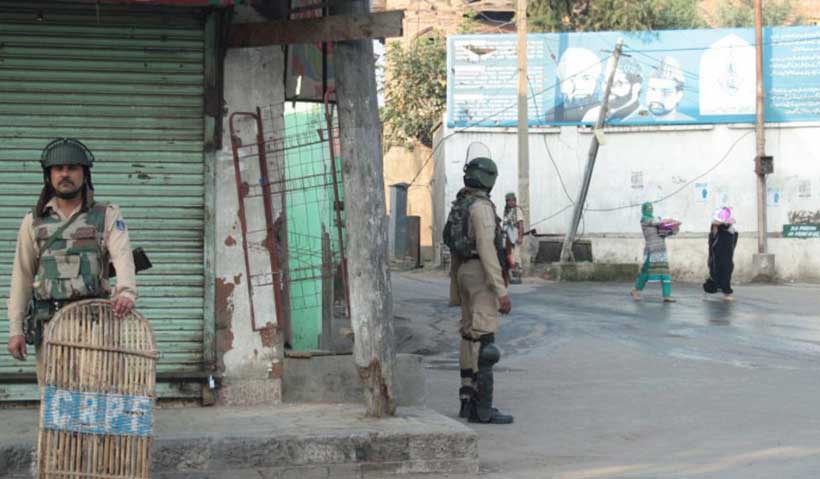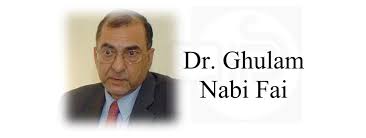 For decades New Delhi has concealed its brutal acts and actions in Kashmir under the pretence of “development and normalcy”. This portrayal of a false sense of normalcy by the successive Indian governments has unfortunately obfuscated the situation on the ground in Kashmir which is still far from normal. Despite lofty claims of improvement, the people in Kashmir still face social and political unrest, economic setbacks, and severe restrictions on their rights and fundamental freedoms. The revocation of Article 370 has led to more economic stagnation, heightened militarization, and the marginalization of indigenous voices. Civil rights advocates, lawmakers, and political workers are imprisoned, and their voices are silenced under the guise of anti-terror laws.
For decades New Delhi has concealed its brutal acts and actions in Kashmir under the pretence of “development and normalcy”. This portrayal of a false sense of normalcy by the successive Indian governments has unfortunately obfuscated the situation on the ground in Kashmir which is still far from normal. Despite lofty claims of improvement, the people in Kashmir still face social and political unrest, economic setbacks, and severe restrictions on their rights and fundamental freedoms. The revocation of Article 370 has led to more economic stagnation, heightened militarization, and the marginalization of indigenous voices. Civil rights advocates, lawmakers, and political workers are imprisoned, and their voices are silenced under the guise of anti-terror laws.
A report published by the Kashmir Institute of International Relations (KIIR) recently has exposed the tactics employed by the Indian government to create a literal smokescreen, diverting global attention from the real issue and obscuring the ongoing human rights violations and violence in the region.
The paper titled “Illusion of Peace: Unmasking the myth of normalcy in Kashmir” provides a comprehensive analysis of the strategies New Delhi has been employing to create an illusion of peace by distorting reality on the ground in Kashmir and disseminating misinformation. The paper uncovers the truths concealed beneath the facade of normality and brings to the fore the severe difficulties faced by the people of the restive region.
“Amidst the Indian government’s much-touted normalcy claims Kashmiris remain deeply embroiled in an unending conflict that continues to take a heavy toll on its population”, the report said, adding that the soldier-civilian ratio of 1:8 makes it one of the most militarized zones in the world.
The report termed the massive troops’ concentration and blanket impunity enjoyed by the Indian armed forces under various laws as the main reason behind a wide range of human rights abuses, including extrajudicial killings, torture and enforced disappearances.
While tearing into shreds the BJP government’s claims of “All is well in Kashmir”, the paper shows that a highly deceptive trend, which perpetuates a false narrative to mask the true conditions in the region, serves as a classical example of Machiavellian deceit and deception.
The report while mapping the civil spaces in the territory, says “The authoritarian actions of the Hindu nationalist government have led to increased limitations on civil society, making it challenging for activists and media to work freely”, the KIIR report said, adding that Kashmir region witnessed a systematic erosion of press freedom.
About relentless Indian state repression, the report said amid unyielding violence, the government’s claim of restoring peace in the state rings quite hallow as the blood of innocent Kashmiris is being spilt with impunity on the streets by the Indian forces, who show no signs of pity, restraint, or remorse in killing innocent Kashmiris.
Referring to the suppression of dissent and dissidents under anti-terror laws, the paper revealed that the criminalization of journalism had made it difficult for journalists to report on the conflict and human rights abuses in the region. “The systematic crackdown on media and journalists preventing them from exercising their right and performing their duties show the erosion of democratic space in the region
About the Modi government’s step-by-step approach to silence NGOs and legitimate political voices in Kashmir, the report shows increasing clampdown on freedom of expression and opinion has led to the closure of several Kashmiri NGOs who have been engaged in social welfare work and other human rights activities in the region.
There are almost over a half dozen NGOs and welfare trusts, including the Jammu Kashmir Coalition of Civil Society (JKCCS), and the Association of Parents of Disappeared Persons (APDP that have been accused of promoting separatism, supporting terrorism, or engaging in anti-national activities, leading to bans, raids, and arrests of their members and leaders. “After 2109, these NGOs have not been able to work as freely as before.
Moreover, the report sheds light on the use and abuse of anti-terror laws that constitute a critical component of the Indian government’s so-called “counterterrorism policy”. According to the KIIR report, at least 14 political parties have been declared outlawed under the notorious UAPA law by India’s Ministry of Home Affairs since 2019.
These illegally banned political parties openly challenge India’s rule over the region and seek resolution of the dispute by UN Security Council resolutions. The report further says that affiliates of these parties have also been facing persecution at the hands of Indian authorities.
Exposing the hollowness of the Modi government’s development mantra in Indian-occupied Kashmir, the report sheds light on the growing uncertainty and a sense of fear and insecurity amongst the Kashmiri masses.
About a dire unemployment crisis that continues to grip the region and its educated youth, the report says the unemployment rate in Kashmir will rise to 23.1% in 2023. “A significant rise in the unemployment rate belies the government’s mantra of economic development of the region”, it said.
“The continued conflict, belligerent military occupation, and suppression of dissent continue to have a profound impact on the lives of the Kashmiri population”, the report further said, while calling upon the international community to acknowledge the ground realities in Kashmir and work towards a peaceful resolution that respects the rights and aspirations of the Kashmiri people.
The report concluded with a piece of advice for India: “The futile attempts to paint a picture of normality and development will not help the Indian government to hide the crucial realities on the ground. New Delhi needs to realise that banning legitimate political expression, silencing people, confiscating their property, firing them and depriving them of their livelihood are anything but normalcy”.
–Shazia Khawaja is a research associate at the Kashmir Institute of International Relations and can be reached at ; Shaziashrafkhawaja@gmail.com








